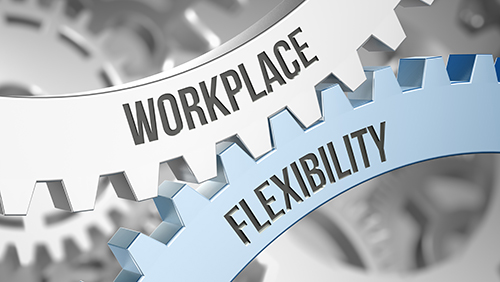 While challenging, workplace flexibility in manufacturing will prove invaluable for remaining competitive now and into the future. A new report, "The Future of Flexible Work in Manufacturing: Workforce Priorities for a Hybrid World," by Manufacturers Alliance, in collaboration with Aon plc, finds five major drivers of success for manufacturers as they shift out of the pandemic and into the future.
While challenging, workplace flexibility in manufacturing will prove invaluable for remaining competitive now and into the future. A new report, "The Future of Flexible Work in Manufacturing: Workforce Priorities for a Hybrid World," by Manufacturers Alliance, in collaboration with Aon plc, finds five major drivers of success for manufacturers as they shift out of the pandemic and into the future.
1. Talent acquisition, development, and retention is paramount, with more than half of executives ranking talent availability as a top factor shaping the future of work.
2. The hybrid work model will prevail for salaried workers in manufacturing, as 80% of companies expect to formalize a flexible remote and in-person approach for employees during the next 12 months.
3. 85% of companies are empowering leaders across the organization to define their hybrid models, rejecting an entirely corporate-led approach.
4. Despite important organizational learning during the pandemic, cultural resistance to change is seen as the biggest barrier to future-of-work strategies and priorities for 59% of executives.
5. Emerging priorities such as environmental; social and governance (ESG); and diversity, equity, and inclusion (DEI) will likely shift to long-term imperatives, as reflected in a ranking of function priorities for leaders in finance, human resources, legal, and compliance.
"As all industries grapple with what the future of work will look like as the country shifts out of the COVID-19 pandemic, manufacturers have unique perspectives," notes Stephen Gold, President and CEO at Manufacturers Alliance. "Given their essential businesses, manufacturers had to find ways to continue operating through the worst of the pandemic while others also shifted to work productively remotely. As the country reopens, we see companies implementing what they learned to provide a more attractive workplace that includes defining more flexible work models."
Other survey highlights include:
- 96% of respondents agree that organizational agility will be a prerequisite for competitiveness
- HR leaders ranked digitalization acceleration, retaining and motivating existing employees, and developing flexible work models as top priorities for the next 12-36 months.
- Developing flexible work models ranks high as both a priority and an area where executives report more confidence in execution.
- Flexible work is one of the most immediate decisions that leaders will make in charting the course for the future of work.
o Pre-COVID, only 12% of department had a hybrid model in place. That’s expected to surge to 80% post-COVID, a 7X increase.
- 15% of manufactures surveyed are considering flexible work schedules; 14% currently offer flexible work options.
- 90% of manufacturers surveyed report challenges in attracting hourly workers.
To remain competitive and attract and retain employees, manufactures will have to find new, innovative ways to provide workplace flexibility at all levels.
Options for creating flexibility in a manufacturing environment include:
- Flexible working hours
- Compressed workweeks
- Split shifts
- Shift swapping
- Part-time positions
ASE member, General Motors, is one of the leading manufacturers stepping out front with a “work appropriately” strategy to provide discretion and flexibility deeper in the organization. Much like the former “dress appropriately” shift in dress codes, “GM trusts employees to ‘make smart decisions without overly prescriptive guidance.’” (Washington Post, April 21, 2021)
The full survey report is available here.
Source: Manufacturersalliance.org